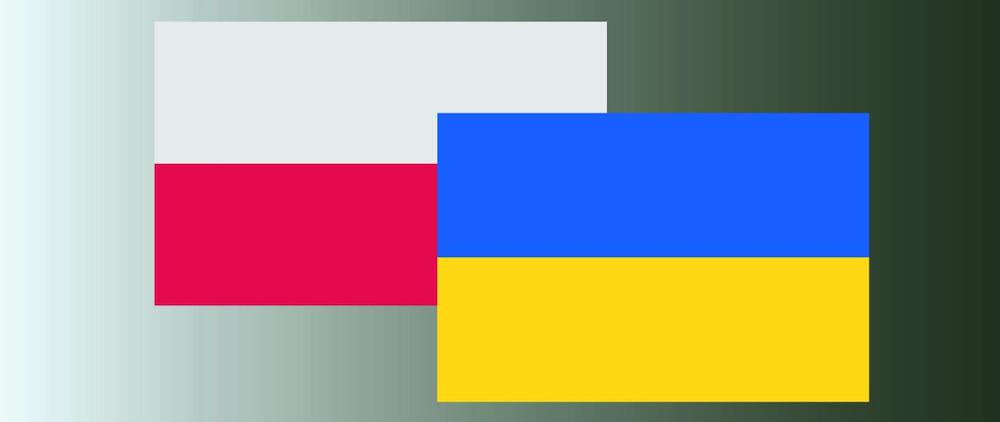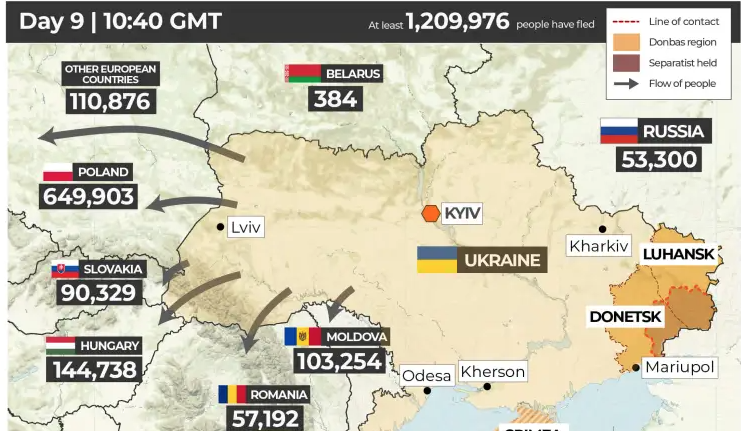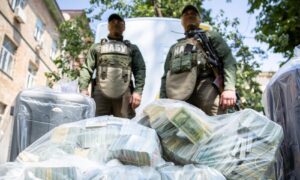(Publisher’s note: This post on assisting Ukrainian refugees will be updated as new information becomes available. This information isn’t targeted at Ukrainians, who likely don’t have Internet access. But if you have friends and family who need assistance, please share this info.)
Russia’s invasion of Ukraine has sent a massive wave of Ukrainian refugees into neighboring countries – an estimated 1 million people as of 6 March, according to UNHCR. That’s the largest involuntary relocation of Europeans since the Yugoslav War in the early 1990s. The European Commission is asking member nations to grant temporary asylum to all Ukrainians for up to three years, but until that happens, asylum is on a country-by-country basis.
Also, if you have military training, you can sign up to fight the Russians here. The New York Times is reporting American military veterans increasingly are making their way to Ukraine.
In 2015, it was Syrians, Iraqis and Afghan refugees arriving on the borders of aggressively anti-refugee Visegrád Group countries such as Hungary and Slovakia, who turned them away, sometimes violently. Now, most of Ukraine’s neighbors are not only suspending visa requirements (and even the need for passports) but assisting with food, clothing and shelter.
Axios has a post with a graphic documenting where they’re going, including Poland, Hungary and Slovakia, where – until the Russian invasion – countries had 90-day tourist visa limits on non-European Union citizens.
The people coming now are statistically unlikely to stay. When Russia invaded Crimea in 2014, part of Ukraine, the number of asylum applications in the EU was only 20,000 in 2015, dropping to 10,000, according to DW.
This is complicated by the fact that not everyone leaving Ukraine is Ukrainian. But most countries, including Poland, are also lifting visa requirements for Indians, Africans and others in the expat/immigrant community.

Poland
Poland is on the front lines of the refugee crisis and already has detailed plans and relief programs in place. You can see the official website here.
Officials estimate that half of all Ukrainian refugees fleeing the fighting have entered Poland, though most are likely to go on to Germany, looking for economic opportunities. The Polish government already has posted official information stating all refugees from the fighting in Ukraine – with or without the proper paperwork – are being admitted.
The information includes reception points directing people to housing.
Here’s some of the most crucial information from the official Polish website.
- If you have not found the information you need, call the hotline: +48 47 721 75 75.
- If you need information on the detailed rules of crossing the border, please contact the Border Guard: +48 82 568 51 19.
- Helpline for Polish citizens and holders of the Pole’s Card residing in Ukraine: +48 22 523 88 80.
- There are information points and helplines in the largest Polish cities.
Germany
Germany has extended the visa-free stay for Ukrainians until at least 31 May 2022 and they can stay 90 days without requesting asylum.
Berlin has become a major hub for refugees from Ukraine, according to the New York Times, and the numbers are growing. On 28 February, city officials reported finding beds for about 350 refugees. By Friday, 4 March, more than 10,000 arrived in the German capital by train and bus, according to the NYTimes post, and the official city website says 6,000 per day are arriving. After Poland, Germany is likely to have the second-largest number of refugees.
Officials are pulling out the stops, and there are a number of websites connecting refugees to people with temporary housing. Here’s the official Berlin page with details about assistance including schools for young arrivals.
The Berlin Life has a complete list of agencies and individuals offering assistance, which you can see here.
German federal leaders have already declared they’ll accept all refugees from the war, according to CNN. But it isn’t clear yet whether that means handing out random refugee status or suspending visa requirements.
Berlin Mayor Franziska Giffey said the capital was looking into providing emergency accommodation. And the state of Mecklenburg-Western Pomerania, which borders Poland, has stopped the repatriation of rejected asylum seekers to Ukraine.
Romania
Aside from Poland, Romania is giving Ukrainians the warmest welcome and the most assistance, according to media reports. Romanians are offering their homes to refugees saying they may stay as long as the war lasts, according to Radio Free Europe.
From that post:
Uniti Pentru Ucraina (United For Ukraine) already has more than 225,000 members, including donors, volunteers, tutors, and Ukrainians seeking help. It’s a project organized by European Parliament member Vlad Gheorghe, along with other Romanians eager to unite local individuals, NGOs, and businesses willing to help.
Like Poland, Romania likely is just a transit point for Ukrainians moving west into the larger economies of Germany, Switzerland, Austria and Italy. Romanian officials announced that as of 1 March, 89,000 Ukrainians had entered the country. Of those, an estimated 50,000 had moved on to other EU countries, according to the RFE post.
Here’s the very detailed official government website for assistance, including how to get an asylum application.
Here’s a public website, Refugees.ro, built by a Romanian cybersecurity expert to aggregate information about assistance efforts.
Slovakia
Slovakia is welcoming all Ukrainians with or without paper work and issuing work permits and financial aid.
Here’s the detailed official government website.
On the borders, several facilities for emergency accommodation are already in place. The Slovak government has set up a temporary emergency camp in Humenné, a small town close to the Ukrainian border. The national parliament repurposed its hotel near the border. Two border regions – Košice and Prešov offered accommodation of their own, including school gyms, hotels and office buildings.
Moldova
Ukrainians initially got a lukewarm reception in Moldova, Europe’s second-poorest country, ranked only behind Ukraine in GDP per household. But that has changed dramatically since the first days of the war. The Globe and Mail in Canada is reporting Moldova is offering Ukrainians employment as teachers, construction workers, IT workers and in the service workers. Radio Free Europe reports that Moldovan authorities have established triage and assistance centers at two border crosses with Ukraine – Ocnita and Palanca. But Moldova’s Interior Ministry stated the centers will also be prepared to offer accommodation to a number of refugees for 72 hours and other officials state the small country is doing everything it can.
By 5 March, an estimated 70,000 people — more than double the Moldovan government’s projections — had entered Moldova, a nation of just 2.6 million.
Hungary
Hungarian strongman Viktor Orbán, a Putin acolyte and authoritarian understudy, is at sixes and sevens over Russia’s invasion of Ukraine. Orbán has left the border with Ukraine open and has said refugees entering Hungary from Ukraine are granted temporary asylum. The government is not assisting them and Hungarian officials are urging them to leave for other safe havens, according to the New York Times and other media. At least 140,000 Ukrainians had arrived in the first week of the invasion, according to media reports.
The Daily News of Hungary has a good overview in English of all the organizations and services working to help Ukrainians refugees.
Al Jazeera has a post looking at the neighbor-to-neighbor efforts on the community level even in notoriously anti-immigration areas.
Republic of Ireland
Ireland has waived all visa requirements for Ukrainians and agreed to take as many refugees as needed. Minister for Foreign Affairs Simon Coveney said that might even mean asking Irish citizens to open up their homes temporarily.
You can see official travel advice here.
United Kingdom
The United Kingdom has put a cap of 200,000 people entering from Ukraine, and the rules are changing every day after the Johnson Administration officials came under pressure to further lift visa requirements for Ukrainians fleeing Russia’s invasion.
While some countries, including Ireland, have entirely waived the visa requirement for Ukrainians, the Johnson government continues to insist that people cannot come directly from Ukraine to the UK without paperwork and must apply for a travel visa in a “safe” country.
See more on Sarah Nagaty’s post about the baggage both expats and immigrants carry.
Netherlands
The Netherlands is far from the war, but efforts to help are ramping up and the government is opening emergency reception centers. The Dutch government has launched a website with details for arrivals. It emphasizes Ukrainians can come without passports and travel freely.
A group of Ukrainian volunteers from Breda/Tilburg and surroundings organize donation collections in kind and materials for people from Ukraine. Any help is welcome, but the most critical things are at this moment the first aid materials and food, especially for small children & babies.
Here’s a the list of things that are badly needed: https://lnkd.in/gtGfjcVY
If you can help, ping us directly at: [email protected]
Austria
Austria is historically reluctant to take refugees, but the city of Vienna is the exception this time. Also, the Austrian government has granted free train transportation to Ukrainians.
More resources (all these groups need your donations):
• CNN Worldwide has a page where you can assist Ukraine.
• The Miami-based organization Global Empowerment Mission is on the ground in Poland, using donations to buy refugees train and plane tickets to help them reach family or friends in Europe.
• World Central Kitchen is feeding refugees on the Ukraine/Poland border.
• The International Committee of the Red Cross is operating in Ukraine.
• Israeli charity United Hatzalah is operating in Ukraine.
You can see more here on the Today Show list of verified charities and volunteer agencies.
Charity Navigator also lists approved organizations helping in this crisis.
You can read more here from Dispatches on Putin and Russia.














